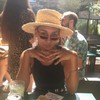Supplied
“We're working on killing it” is the first thing glaive told VICE when asked about the future of hyperpop. “It's happening slowly but surely.”Since its second wave in 2019, Hyperpop has been cited as the internet’s most hated genre. For artists nested under the term, it’s become an umbrella adjective, not necessarily pertaining to a certain type of music or sound but instead to an internet-adjacent Gen Z cohort making tracks from their bedrooms. The first wave of hyperpop can be traced back to the 2010s. The rise of pioneering popstar SOPHIE, whose chaotic avante-garde sound came to dominate in the mainstream, kicked off a global movement filled with experimentation and cross-pollinating genres. Back then, the songs were characterised with sugary, synthesised vocals and a hyperkinetic, electronic bass.The second wave began in 2019 – post-100Gecs - with a sound that further opened the doors to freedom of expression. They took scraps from music across the world, throwing it into their own personal blender. For them, anything and everything was fair game.“I remember specifically when it started getting described as hyperpop. A very, very sweet lady by the name of Lizzy Szabo created a playlist on Spotify and she put a lot of mine and my peers music on it,” 19-year-old musician, ericdoa, told VICE. “And I guess everybody just flocked to it and just started calling it that.”“I mean, that word has been around for a long time, but it's been used to describe 30 million other different types of things.”For young artists like ericdoa and glaive, who float somewhere between the underground and the mainstream and are still both in their teens, hyperpop no longer encapsulates the music it once did, or the music they’re currently making. For a generation often identified as hyper-connected and ambiguous, hyperpop is another restrictive term created by someone a bit older to make sense of their own musical world. “I think for people who aren’t very well-versed in music it’s just a cushion to fall back on,” said ericdoa, “Instead of genre-less music, they have something to call it.”Unlike genres like R&B, blues, and even punk, which can all be dated back to a time and place in the physical world, music labelled “Hyperpop” was born in a new space with little to no boundaries: The internet. The innate ability to be in hundreds, if not thousands, of different online places at once while simultaneously seated in the comfort of your own bedroom created music that was undefinable. For whatever reason, “Hyperpop” became the term everyone landed on to define it. “It’s an obvious usage,” said glaive, “There's obviously genre to every music but I don't think that you can really slap one genre and have that be exactly what it is. And that's how a lot of music is nowadays because everyone has access to everything.”“I can go on Spotify and listen to anybody at any time, any genre, any time period, anything. It allows you to take as much or as little inspiration as you want. I have friends that listen to music everyday and they'll say, ‘I want to make something more like this’, and it'll be a song that has 13 views on YouTube from 1997.”It’s a prominent theme with many upcoming artists, whether they be R&B, hyperpop or something else. There’s a willingness to experiment.But the rejection of the term “hyperpop” by its constituents is less a case of placing artists under the wrong genre and more a lesson in how the next generation of musicians' are changing their mentality.These creators are young, self-produced, experimental, and most began creating music in the depths of the pandemic, when the internet was the only thing connecting them to the outside world. They all seem to know each other, and are often collaborators. A happy accident that comes with building yourself online.Though other artists under the “hyperpop” label like cookii, midwxst, daine and aldn share similarities – from the lowercase nature of their names to the electronically-intertwined music that they make – they’re less a new wave of hyperpop and instead a new wave of gen z musicians. For now, it’s obvious that hyperpop - at least as something new artists want to claim as their own - is dead. “We’re all just working in the same world,” glaive said, “Nobody's really making the same exact shit anymore”. “I couldn't care less about genre. If people like the music, then people like the music.”Follow Julie Fenwick on Twitter and Instagram.Read more from VICE Australia.
Advertisement
Advertisement
Advertisement
